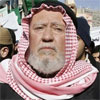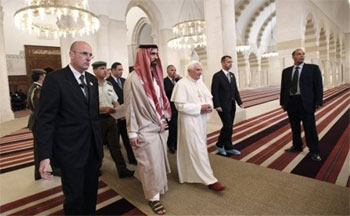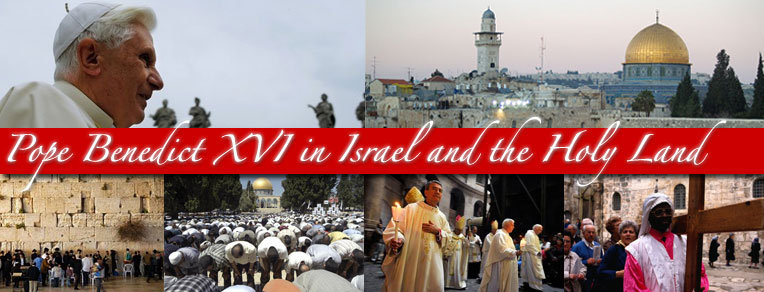The name of the tranquil Bavarian university town where Benedict once taught theology has become shorthand for how a man as intelligent as the pope can commit an enormous interfaith gaffe. His long-awaited address today in the King Hussein bin Talal Mosque, Jordan’s magestic state mosque on a hilltop in western Amman, was an eloquent call for Christians and Muslims to work together to defend the role of faith in modern life. Rather than hinting that Islam was irrational, as Muslims understood him to say in Regensburg, he called human reason "God’s gift" to all. Christians and Muslims should work together using their faith and reason to promote the common good in their societies, he said, and oppose political manipulation of any faith..I wouldn't characterize it as an anti-Regensburg speech, as Reuters does with their headline. In fact, those familiar with the Pope's original Regensburg address will note that today's speech reiterated one of Regensburg's fundamental points (minus the tangential and disputed observations on Islam).
 Heneghan surveys the reactions to Benedict's speech at the bin Talal Mosque:
Heneghan surveys the reactions to Benedict's speech at the bin Talal Mosque:
So has Benedict “made up for Regensburg” or managed to trump it with this speech? His critics here naturally didn’t think so. Sheikh Hamza Mansour, a leading Islamist scholar and politician, told my colleague Suleiman al-Khalidi that the pope had “not sent any message to Muslims that expresses his respect for Islam or its religious symbols starting with the Prophet.” Benedict had spoken on Friday about his deep respect for Muslims, but not specifically for Islam.
“I wouldn’t want to read too much into selecting a particular word or not,” Ibrahim Kalin, a Turkish Islamic scholar and spokesman for the Common Word group of Muslim intellectuals promoting dialogue with Christians, told me by phone from Ankara. The speech was “very positive,” he said. “He said many other things in this speech. He said Christians and Muslims pray to the same God. That’s an expression of enormous commonality. I would go by the context of what hes saying. It’s a long way from Regensburg speech.”
Kalin, who also teaches at Georgetown University in Washington, said this speech couldn’t “make up for Regensburg” but it did represent an evolution in the pope’s thinking about Islam. “He’s made substantial changes (in his thinking) but he’s not coming out and saying ‘I atone for my sin at Regensburg.’ Kalin said. He’s not saying that and he’s not going to say that. But reading between the lines, it’s happened gradually.”

Responding to the Holy Father, H.R.H. Prince Ghazi bin Muhammad bin Talal, a cousin of King Abdullah II, welcomed the Pope -- acknowledging him "as the Spiritual Leader, Supreme Pontiff and the successor of St. Peter for 1.1 billion Catholics"; "as a Head of State who is also a world and global leader", "a simple pilgrim of peace" and "as Pope Benedict XVI in particular"
whose reign has been marked by the moral courage to do and speak his conscience, no matter what the vogue of the day; who is personally also a Master Christian Theologian responsible for historical Encyclical Letters on the beautiful cardinal virtues of Charity and Hope; who has re-facilitated the traditional Latin Mass for those who choose it, and who has simultaneously made intra-faith and inter-faith dialogue a top priority of his reign in order to spread goodwill and understanding throughout all peoples of the world.You can read the full text of Prince Ghazi bin Muhammad bin Talal's response to Pope Benedict here.
Those observing the Pope's tour of the mosque today couldn't help but notice that he didn't take off his shoes -- a standard courtesy and Islamic custom.
Reuters' Tom Heneghan (Faithworld probes the sole-searching question of Benedict's visit to the Amman mosque:
Jordanian officials said the tan carpets rolled out for him to walk on protected the mosque’s normal carpeting, on which Muslims pray, from any shoe dirt. He therefore did not have to follow the traditional practice of leaving his shoes at the door, they explained. One said that Benedict’s hosts, who also opted to trod while shod, made the exception in deference to the 82-year-old pope’s age. Jordanians are proud of their traditional Arab hospitality and that might explain their readiness to accommodate their guest.(For the record, the Pope did take off his shoes during his visit to the Blue Mosque of Instanbul in November 2006).“We were all ready to take off our shoes … the persons who guided us did not ask us to do it,” Rev. Federico Lombardi, the Vatican spokesman, told journalists keen to find out more about a potential gaffe.
See also:
- Benedict XVI sets new papal record for mosque visits, by John Allen Jr. (National Catholic Reporter)
- "Listen to Reason", by Gregory Wolfe (Commmonweal):
It’s quintessential Benedict: to choose what most will see as an esoteric topic–reason–rather than something in the realm of ethics or social justice, as the place where he wants to generate dialogue.
I happen to think he’s right: reason’s relationship to faith is the root issue. Given the rich tradition of Islamic scholarship, it ought to be something that both sides can build upon. ...
But I have to confess that when I encounter the Pope addressing the world in this way I have a twinge of almost embarrassed tenderness for his seemingly Quixotic approach to things.










No comments:
Post a Comment